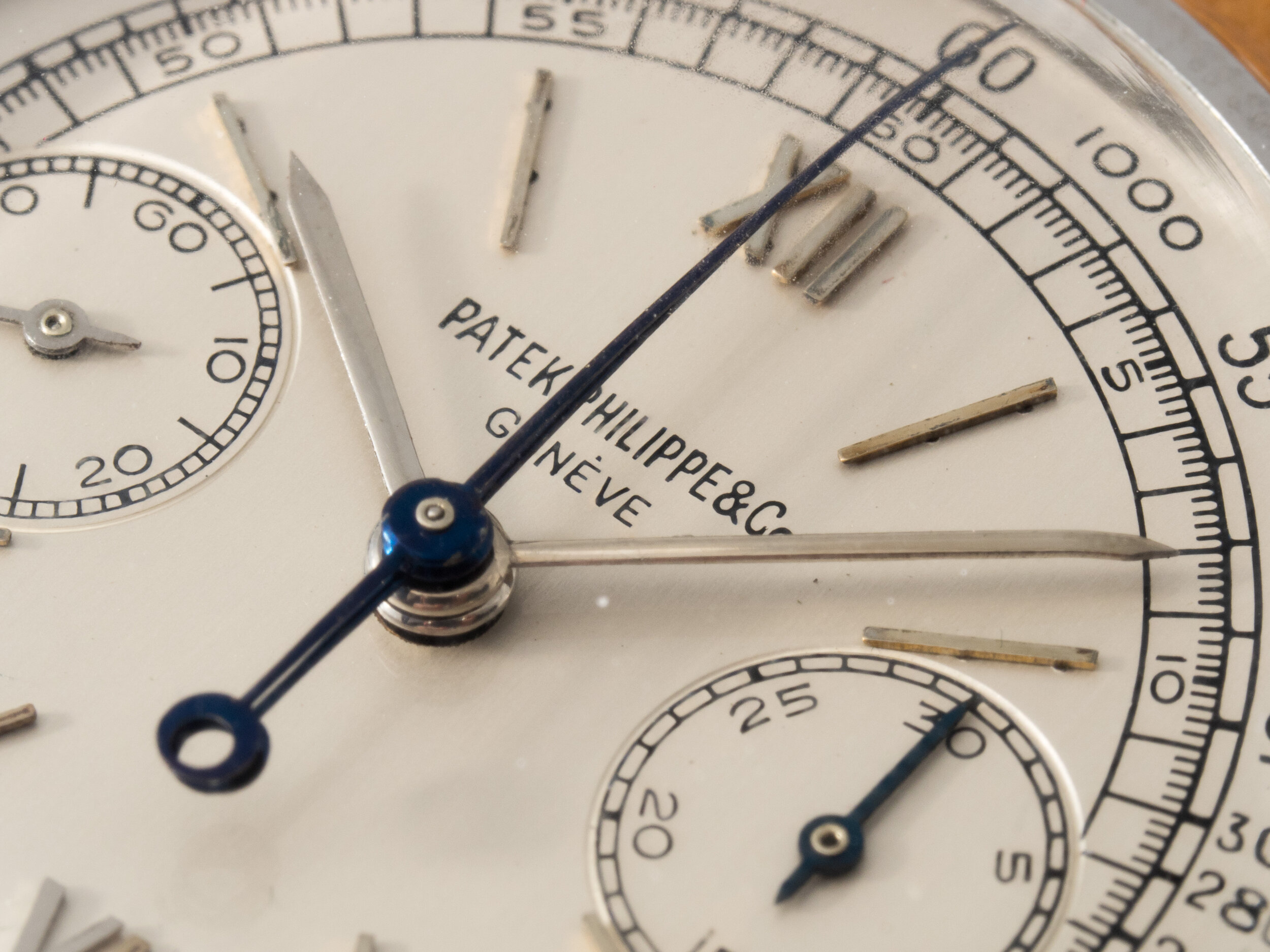Stainless steel Patek Philippe chronograph. It’s a phrase that’s practically mythology, a rare character you’re more likely to find in Hogwart’s Forbidden Forest than at any watch meetup, zoom call, or even auction catalog. A purveyor of luxury watches, Patek deals mainly in precious metals, so any time one of its references is found in stainless steel — particularly complicated models — it’s an event.
A stainless steel Patek is desirable not only for its rarity but also for how understated, even contradictory it is. Imagine, paying more for a watch cased in steel than in gold, surely meaning less onlookers will notice your wristwear. It’s the ultimate statement piece, but for what it leaves unsaid.
Among the rarest of vintage stainless steel Patek Philippes is the reference 1436, a split seconds chronograph manufactured from 1938-1971. While about 140 examples are thought to have been produced, only three are known to the modern market in stainless steel. Patek was the first to put a split seconds complication into a wristwatch, so the reference 1436 is something of a follow-on to those early efforts. The reference 1436 is equipped with the Patek caliber 13-130 CCR.
Since there are only three known examples of the ref. 1436 in stainless steel, they appear in public rarely: the last example sold at auction in 2015, having previously sold in 2009. Another known example was last seen in 1994, and the final example is documented in the pages of John Goldberger’s tome, Patek Philippe Steel Watches (the example sold in 2015 is also document in those same pages).
Let’s take a look at the three known examples of the Patek reference 1436 split seconds chronograph in stainless steel.
1. Steel reference 1436: The recent sales
Sold by Phillips in 2016 for CHF 3.3m
Sold by Antiquorum in 2009 for CHF 1.25m
Most recently, Phillips sold a reference 1436 at auction in 2016. According to Phillips’ catalog entry for this example, it’s known that a small number of stainless steel cases were produced in the 1940s, but only a handful were actually used and equipped with the split seconds caliber.
This particular watch was sold to the Henri Stern Agency, Patek’s exclusive importer in the U.S. It was manufactured in 1945 and later sold in 1949, and with no watchmaker’s marks on the case back, it is possible the watch hasn’t been serviced since. Phillips added that watch appears to have been hardly worn throughout its life, perhaps polished once.
Case No.: 630,772; Movement No.: 863,056
In this post, Charles Tearle, formerly of Antiquorum, tells the story of the three year journey to find this example:
2. Steel reference 1436: Astrua Torino
The second known example was last sold publicly by Antiquorum in 1994. As Phillips explained in its auction listing of the first example above, “ It is understood that [this] watch is in the private ownership of one of the world’s most important collectors, with a very small chance of becoming available for purchase in the foreseeable future.” The mind races as to who this important collector might be!
This reference 1436 is distinguishable by the signature for Astrua Torino at 6 o’clock, an important Italian retail partner for Patek in the 20th century. This particular example was manufactured in 1940, putting it at the early end of the reference 1436’s production run. Another steel reference 1436 (with case no. 626,223, the consecutive number to this example), was completed in 1941, but later re-cased into a more popular (at the time) yellow gold case after failing to sell in steel.
Case No.: 626,222; Movement No.: 862,534
3. Steel reference 1436: Pulsation dial
The third and final example of the reference 1436 in stainless steel is featured in John Goldberger’s book, Patek Philippe Steel Watches. And this one might be the best one yet: it features a pulsation dial, itself a rare trait on a Patek chronograph. The case number is 630,775, making it just three away from the first example above, sold by Phillips in 2015. With that example having sold for CHF3.3m, one has to believe that this particular example would command even more if it ever shows up at auction. According to Goldberger, this example was manufactured in 1952 and sold in 1956.
Additionally, this example is a second generation reference 1436, as distinguished by the second co-axial button inside the crown to operate the split seconds hands. This makes it the only second generation example of the steel reference 1436s.
Case No.: 630,775; Movement No. 868,327
Thanks to Charlie (books_on_time) for his help with this piece.



